STRATEGIC ASSESSMENT. The latest Saiful Mujani Research and Consulting (SMRC) survey, released previously, showed that the majority of Prabowo Subianto’s voters in the 2019 elections shifted to Anies Baswedan, while the majority of Jokowi’s voters shifted to Ganjar Pranowo.
Of the total 55.5 percent of Jokowi–Ma’ruf Amin’s voters in the 2019 elections, 44 percent of them are likely to choose Ganjar Pranowo, 22 percent choose Prabowo Subianto, and the remaining 20 percent choose Anies Baswedan.

SMRC founder Saiful Mujani emphasized that the shift in support from Prabowo to Anies was due to the Islamic sentiment raised by Prabowo, which is now shifting to Anies, who he described as being quite consistent in carrying out Islamic politics.
According to the results of a survey by pollster Indikator Politik Indonesia for the period Dec. 1 to 6, 2022, the electability of the NasDem party has continued to rise since August 2022. Indikator Politik Indonesia Executive Director Burhanuddin Muhtadi said that the electability of the party reached 5.1 percent in the most recent poll, an increase from four percent in August 2022.
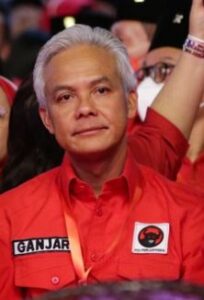
Central Java Governor Ganjar Pranowo’s electability has ticked up slightly amid speculation that the ruling Indonesian Democratic Party of Struggle (PDI-P) matriarch Megawati Soekarnoputri will make her final decision on the party’s 2024 presidential candidate during the party’s upcoming 50th anniversary celebrations.
A survey by Indikator Politik showed that Ganjar had maintained his front-runner status and seen his electability rise to 32.8 percent in December, up from 30.8 percent in the previous month, while House Speaker Puan Maharani, his rival for the party nomination, remained at the bottom rank in the same month with 1.9 percent.
Ganjar’s rising electability coincided with President Joko “Jokowi” Widodo’s improvement in his approval rating in the same month to 71.3 percent, his highest since August, bolstered by the public’s positive perception of Indonesia’s hosting of the Group of 20 Summit. 35.4 percent of respondents would vote for Ganjar and State-Owned Enterprises Minister Erick Thohir as running mates, if the 2024 presidential election were held today, according to a recent poll by Indikator Politik Indonesia, marking a 4.6 percent increase since November last year.
Meanwhile, 30.4 percent would vote for Anies Baswedan and Agus Harimurti Yudhoyono, and 19.8 percent would vote for Prabowo Subianto and Puan Maharani.
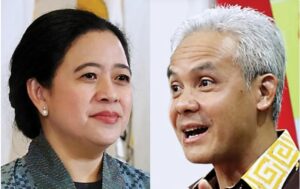
While President Jokowi had to endure several challenges to his administration in 2022, a recent survey found that the President closed the year with a 71.3 percent approval rating, his highest since August, buoyed by the public’s positive perception of Indonesia’s hosting of the G20 Summit.
The survey, conducted from Dec. 1 to 6, 2022, with 1,200 respondents and released on Wednesday, showed that the public viewed the summit as a “win” for Indonesia, with 89.2 percent of respondents were aware of the event believing that Indonesia’s success in hosting the summit would strengthen the country’s profile among the global community.
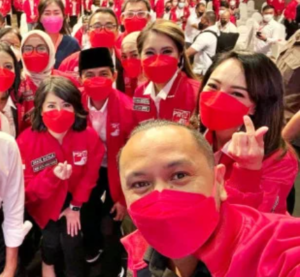
Indonesian Solidarity Party (PSI) Board of Trustees Deputy Chair Grace Natalie apologized to Indonesian Democratic Party of Struggle (PDI-P) Chair Megawati Soekarnoputri for nominating Ganjar Pranowo for the 2024 presidential election. Grace reasoned that Ganjar’s candidacy was not intended to challenge PDI-P cadres, but rather to represent the people’s aspirations. “As a result, PSI sincerely apologizes to Megawati on this occasion,” Grace said.
In a speech commemorating the 50th anniversary of the Indonesian Democratic Party of Struggle (PDI-P), Party Chair Megawati Soekarnoputri was unmoved by pressure from a number of parties who wanted the party, who won the 2014 and 2019 elections, to immediately announce the presidential candidate for the 2024 elections.
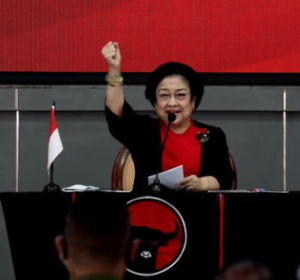
She emphasized that her party consistently prepares cadres in a mature way to continue nation-building and reminded other parties to follow suit and not try to take advantage of the success of PDI-P cadres.
President Jokowi praised PDI-P Chair Megawati Soekarnoputri for not being in a hurry in announcing the name of the presidential candidate for the 2024 presidential election during the party’s 50th anniversary event.
Megawati’s demeanor demonstrates caution and calm when making decisions, Jokowi said, adding that he was pleased when Megawati stated that her party’s presidential candidate would be drawn from within the party’s internal cadres. As a result, Jokowi invited all PDI-P members to wait patiently for the announcement.
Indonesian Democratic Party of Struggle (PDI-P) Central Committee Chair Puan Maharani said that PDI-P Chair Megawati Soekarnoputri had picked the presidential candidate the party would carry. Puan also asked party cadres not to be confused about who would be PDI-P’s presidential candidate because Megawati had already made a decision.
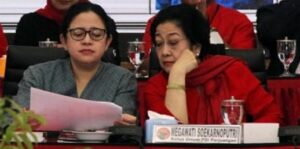
Puan said Megawati had prepared a surprise at the celebration of the party’s 50th anniversary which will be held on Jan. 10. According to her, it could be an announcement of presidential and vice presidential candidates to be endorsed by the party.
Head of the Indonesian Democratic Party of Struggle (PDI-P) Megawati Soekarnoputri appeared to criticise other political parties that have backed politicians who are not their own cadres as a presidential candidate for the 2024 election.
“It’s funny how people in politics now are, don’t imitate them,” she referred to parties which are backing a non-member as a potential candidate. “Don’t they have their own cadres?” said Mdm Soekarnoputri who was greeted with applause from members of PDI-P.
A political party can only nominate a presidential candidate if it has at least 20 per cent of the total seats in parliament or obtained 25 per cent of votes in the previous legislative election. Ruling party PDIP is the only party which can nominate a presidential candidate without forming a coalition as it has 22.26 per cent of the seats in parliament.
Academician Mada Sukmajati stated that some people wanted Ganjar Pranowo and Erick Thohir to continue Jokowi’s leadership, citing the results of pollster Indikator Politik Indonesia survey, which found the Ganjar and Erick pair to have the highest electability (38.6 percent).
The duo’s electability is higher than Anies Baswedan and Agus Harimukti Yudhoyono (AHY) pair (35.4 percent) and Prabowo Subianto and Puan Maharani (19.8 percent). He said Ganjar and Erick’s high electability was due to the public’s desire for a leader who was approachable, simple, and friendly, similar to President Jokowi.
Ganjar Pranowo’s popularity as a potential Indonesian presidential contender rose to an all-time high after President Joko Widodo signaled his support. Ganjar was the choice of 29.5% of respondents in a December survey by Indikator, the highest his popularity has been since the pollster began collecting data in 2020. This happened after Jokowi told his fans to pick a ‘white-haired’ leader, which was widely seen as a nod to the Central Java governor.
While the world’s third-largest democracy will only vote for a new president in 2024, political parties have started maneuvering to find the candidate that can keep them in power. The other top contenders former Jakarta Governor Anies Baswedan and Defense Minister Prabowo Subianto have announced their plans to run for the presidency, while Ganjar hasn’t declared his bid.
Baswedan’s electability declined to 22.8% in December, while Prabowo’s rose to 19.5%, according to the pollster. Indikator also found that Ganjar’s popularity rose in tandem with the recovery in Jokowi’s support. Both men belong to the Indonesian Democratic Party of Struggle or PDIP. There is instead a negative correlation between the president’s approval against the electability of Baswedan.
“When Jokowi’s approval goes up, Ganjar’s also goes up. When Jokowi’s approval falls, Ganjar’s also slips,” said Indikator Politik Executive Director Burhanuddin Muhtadi in a briefing on Wednesday. “This approval pattern also has an impact on party electability. PDIP is getting the impact.” The survey was done in Dec. 1-6 involving 1,220 respondents spread across the country, with a margin of error of about 2.9% with 95% confidence.
The General Elections Commission (KPU) is committed to organizing the 2024 General Elections under the open-list proportional representation system, according to resolutions of the hearing meeting of the House of Representatives’ Commission II.

House Commission II Chair Ahmad Doli Kurnia noted that all parties at the meeting concurred on organizing the 2024 General Elections under the prevailing Election Law.
As per the meeting resolution, the House Commission II reminded the KPU to work to the best of its abilities according to functions, duties, and authorities conferred on the electoral organizer in accordance with the law, the commission chair said.
General Elections Commission (KPU) official Idham Holik said the 2024 elections will maintain an open proportional system. Meanwhile, former vice president Jusuf Kalla on Monday said the open-list proportional representation system used in Indonesian elections must not be replaced and ways to remedy its negative effects must be sought instead.
Nahdlatul Ulama (NU) Executive Board Chair Yahya Cholil Staquf, a.k.a. Gus Yahya, said there is no presidential or vice-presidential candidate acting on behalf of the Islamic organization. If there is a candidate from NU, they will highlight their own achievements, not on behalf of the organization. He also emphasized that his party would restore NU’s position as neutral, clearing it from the list of competing groups.
Two House deputy speakers, Sufmi Dasco Ahmad and Muhaimin Iskandar, voiced their rejection against the idea of using closed-list proportional system for Indonesia’s 2024 elections. A similar sentiment was also shared by House Commission II Chair Ahmad Doli Kurnia, who on Wednesday said eight House political party factions reject the closed-list proportional election system.
The eight factions are the Golkar Party, Gerindra, NasDem, National Awakening Party (PKB), Democratic Party, Prosperous Justice Party (PKS), National Mandate Party (PAN), and United Development Party (PPP).

Eight political parties: Golkar, Gerindra, NasDem, the National Mandate Party (PKB), the Democratic Party, the United Development Party (PPP), the Prosperous Justice Party (PKS), and the National Mandate Party (PAN), held a meeting in South Jakarta, yielding a five-point decision, one of which is the rejection of the proposed closed-list proportional system in the elections in order to maintain commitment to democracy.
Second, they determined that the open-list proportional system was appropriate and in accordance with the Constitutional Court’s decision. Third, the General Election Commission (KPU) carries out its responsibilities while remaining impartial. Fourth, appreciation for the budget for the 2024 election. Fifth, dedication to fair competition.
Pro-government and opposition parties put on a united front against a push to ditch the current open-list proportional representation format for legislative elections, which allows voters to have an influence over legislative candidates put forward by political parties.
A member of the ruling Indonesian Democratic Party of Struggle (PDI-P) is challenging the 2017 General Elections Law at the Constitutional Court, seeking to restore a closed-list system, in which voters solely vote for parties that in turn exclusively decide the winning candidates proportionate to the number of votes won.
In a joint statement, eight of nine political House factions stressed their shared opposition to changing the current open-list system, describing the prevailing mechanism as “progressive and characteristic of our democracy” that should be maintained.
The statement was signed by the pro-government Golkar Party, Gerindra Party, Nasdem Party, National Awakening Party (PKB), National Mandate Party (PAN), and United Development Party (PPP), as well as opposition parties the Democratic Party and the Prosperous Justice Party (PKS).
Constitutional Court is currently hearing a case against Law No. 7/2017 on elections, which seeks to convert the open-list proportional system to a closed one in the 2024 legislative election.

Vice President Ma’ruf Amin on Friday expressed hope that the Constitutional Court would uphold the principles of free, fair, and transparent elections. Ma’ruf said that the open proportional system has been used numerous times in Indonesia’s elections.
President Joko “Jokowi” Widodo said he may reshuffle his cabinet in the next few days, as some political sources bet on a last major realignment of his government to complete programmes ahead of elections due to be held in 2024.
Speculation about a reshuffle has been growing since Nasdem, one of seven political parties in the ruling coalition, announced it would back former Jakarta Governor Anies Baswedan in the 2024 presidential election – a politician seen as a potential rival to Jokowi’s successor.
Members of the Indonesian Democratic Party of Struggle (PDIP) party have since called for him to sack Nasdem members in the cabinet. When asked about an upcoming reshuffle, Jokowi confirmed he was planning a cabinet shake-up. “Could be Friday, Monday, Tuesday, or Wednesday,” he told reporters, during a visit to Riau province, without elaborating.

President Jokowi hinted at a reshuffle in the Onward Indonesia Cabinet in 2023 as he urged all people to wait for his next step, but said “just wait” when questioned whether the cabinet shake-up will come from the NasDem Party.
Previously, the issue of changing ministers in the cabinet arose after the NasDem Party, a member of the coalition party supporting the current government, announced that it endorses opposition former Jakarta governor Anies Baswedan as the 2024 presidential candidate.
NasDem Party Deputy Chair Ahmad Ali had earlier underlined that there was no reason for his party to withdraw from the coalition. He asserted the party’s commitment to guarding the Jokowi and Ma’ruf administration until 2024.
Indonesia is bracing for a tumultuous political year in 2023 as parties gear up for the upcoming general elections next year, raising fears of heightened uncertainty that analysts say could derail the nation’s economic recovery. Voters are expected to choose a new president in 2024, with President Jokowi constitutionally barred from seeking a third term.
Political parties, however, have until Nov. 25 to decide which candidates they will endorse to replace Jokowi, during which party elites are expected to engage in a political tug-of-war and horse-trading in their attempts to build alliances for the electoral contest. Most parties in the ruling coalition have yet to nominate their presidential candidates, while those who have are still leaving the door open for changes.
Golkar Party Deputy Chair Nurdin Khalid recently said that the United Indonesia Coalition (KIB), comprising of the Golkar Party, the National Mandate Party (PAN), and the United Development Party (PPP), is still finalizing their coalition format. Nurdin also dismissed the coalition concept’s deadlock.
However, the coalition continues to hand over the affairs of presidential and vice presidential candidates to each political party. Nurdin also said that Golkar would continue to support Airlangga Hartarto as a presidential candidate, with Central Java Governor Ganjar Pranowo as a vice presidential candidate, if he later offers to join.
The Home Affairs Ministry has issued Circular Letter Number 900.1.9/9095/SJ, asking regional heads to support and ease the implementation stages of the 2024 General Elections. In the circular, Home Affairs Ministry Suhajar Diantoro outlined a number of supports that need to be provided by local governments, such as providing facilities for sub-district election committees (PPK) and voting committees (PPS).
Regional governments are also required to deploy personnel to assist in the establishment of the PPK and PPS secretariats. In accordance with the law, the PPK secretariats must be established no later than January 10, 2023, while the PPS Secretariat needs to be formed no later than Jan. 24.






